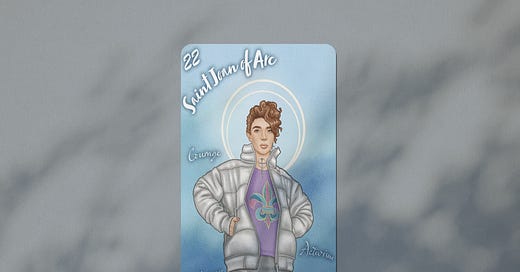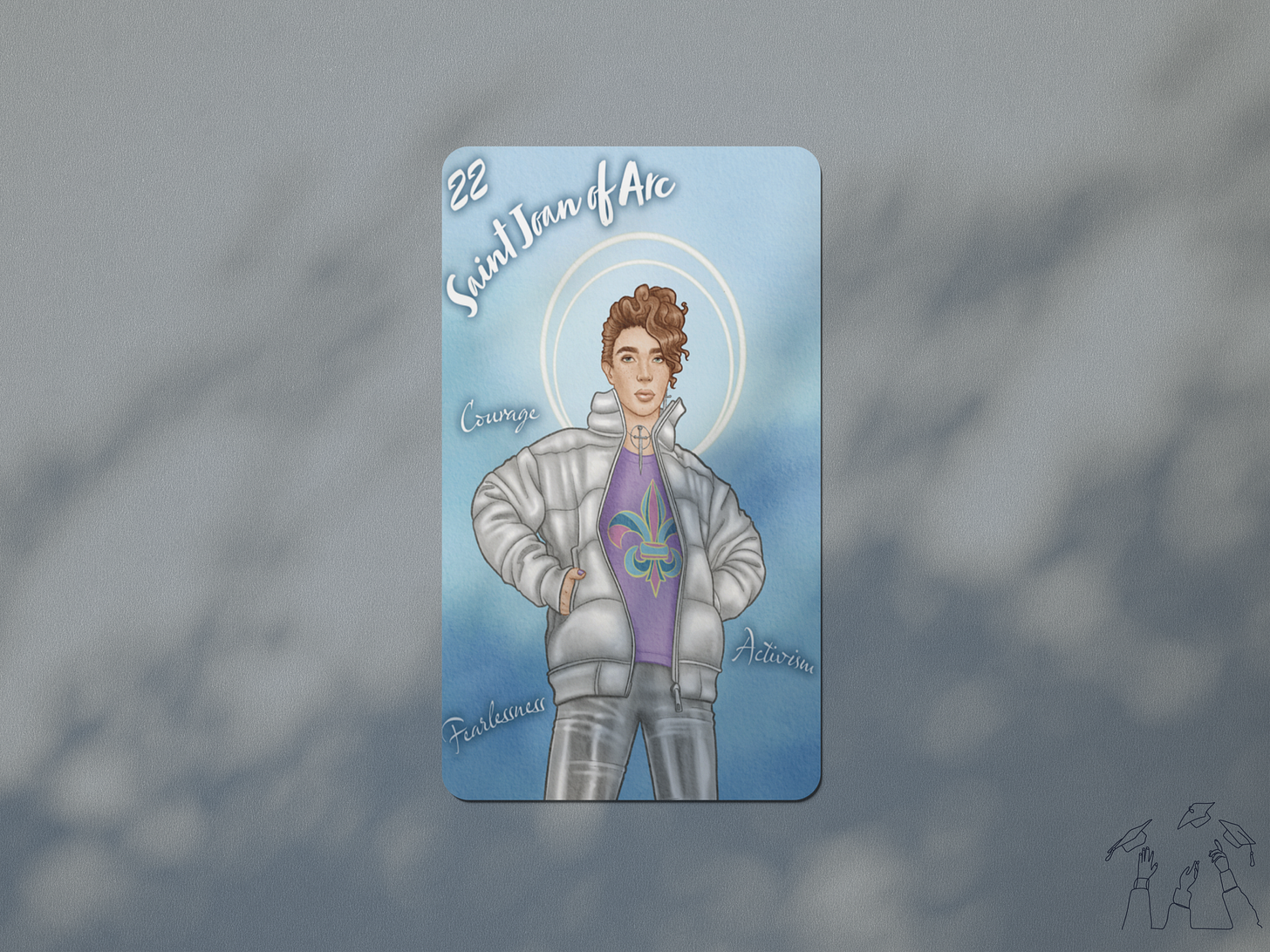If you’re new to The Rebel MFA Way, welcome! This is my daily work for my Write by the Cards: 30 Day Challenge that I’m hosting. Learn more here. Scroll down to the end to see my behind-the-scenes commentary and source material.
During the reunion, the character realized something important: {draw a card}.
The city skyline looked like someone had lined up a row of steel knives and aimed them at the clouds. From the cracked window of my room—a room generously described as “functional” by the landlord who probably hadn’t set foot here since 2042—I could see Dominion Systems’ central tower gleaming in the distance. It sat there like it owned the world. Which, in a way, it did.
The screen in front of me glitched, the faint blue light making the peeling wallpaper glow. I was mid-rant—something about their latest fuel tax hike—when the glitch happened. Not just the usual freezing cursor, but something alive.
A line of text appeared:
“They’re watching.”
“What’s new?” I said aloud.
But then the message melted into the pixels of the screen.
“Huh,” I said. “That’s new.”
I waited for another message, perhaps an elaboration, because well, duh, of course they’re watching.
When haven’t they been keeping an eye on everything we do and say?
•••
The next time the message showed up, it came with coordinates—an abandoned server farm on the outskirts of the city. I wasn’t dumb enough to walk into a potential trap without backup, so I grabbed Nix and Calder. Nix had a habit of chewing gum during high-stakes operations, like life-threatening tension paired best with spearmint, and Calder was always two steps away from quoting Nietzsche. Perfect teammates.
The server farm wasn’t just dead—it was ancient, a mausoleum of shattered hard drives and coffee-stained keyboards. We found a single terminal still humming, its screen displaying the name Orléan in looping code. That was when the voice came through, soft but firm, like it was speaking directly into my brain:
"They’ve stolen the world, Joan. It’s time to take it back."
I don’t know if I was more freaked out that a rogue AI knew my name or that it made sense. Because Dominion wasn’t just taxing fuel and hoarding water—they were logging our every move, squeezing us dry, and leaving us to rot.
•••
The first hack was just a warm-up. Dominion was rolling out a fancy new surveillance drone—thousands of shiny little spies to keep people in check. I crashed the launch with a simple reroute: their perfect prototypes scrambled, scattering like a flock of blind birds and smashing into their shiny tower. The footage went viral before Dominion could blink.
I expected panic, retaliation, maybe a drone at my front door. Instead, more people started joining me. Nix set up an encrypted network; Calder brought in people who could turn scrap metal into literal weapons.
It felt… good, like I was finally doing something real. Like maybe this city wasn’t doomed after all.
But here’s the thing about standing up to a corporation that eats protests for breakfast: They notice. And they fight back.
Harder and more vicious because they are scared of losing.
•••
The night it all went to hell, I was running an operation to expose Dominion’s secret: they weren’t just tracking people; they were rewriting public records to erase entire neighborhoods from existence. It wasn’t just surveillance—it was erasure.
I didn’t see it coming when Calder sold me out.
“They offered me a deal,” he said, not meeting my eyes. “I didn’t think they’d… I didn’t know they’d take it this far.”
That’s when the guards came in, armed to the teeth. They dragged me to the tower I’d been trying to burn down since this whole thing started.
•••
Dominion didn’t kill people quietly. They broadcast it. An example, a warning, a flashy little reminder that resistance wasn’t just futile—it was suicide.
They strapped me into the chair, their CEO staring down at me like I was some kind of glitch in her perfect code.
“You think you’re some kind of hero,” she said, her voice slick as oil. “But you’re just noise.”
I smiled. Not the shaky kind, but the kind that makes people uncomfortable. The kind that says, Oh honey, you have no idea what’s coming.
Because while they’d been busy preparing their little show trial, I’d been busy too. The virus I’d built was already in their system, chewing through firewalls like a rat through drywall.
“Any last words?” she asked, clearly hoping I’d beg.
“Yeah,” I said, locking eyes with the nearest camera. “You can smother the flame, but you’ll never kill the spark.”
When they flipped the switch, the screens in their shiny tower went black. Across the city, Dominion’s surveillance feeds collapsed.
•••
They thought killing me would end the rebellion. Instead, it turned me into a goddamn legend.
Every screen in the city lit up with my face, glitchy but unmistakable, staring down at them. My voice, calm and steady, carried through the static:
"You are free."
It wasn’t true yet. But it would be.
Months later, the people who’d rallied behind me still whispered my name. They painted my words on walls and built shrines from broken drones. Somewhere out there, Orléan was still running, its code spreading, evolving, waiting.
And me? I’d like to think I’m still here too. Not in the literal sense—getting fried by an electric chair kind of puts a damper on that. But in the cracks of their systems, in the hearts of the people who refused to stop fighting.
Because you can smother the flame, but you’ll never kill the spark.
Behind-the-Scenes Commentary
This was an interesting piece to work on because the moment I pulled the card, I knew I was going to go futuristic with it. Partly because I love this deck and the “modern rendering” of these characters. And really, when I sat down to think about what kind of rebellion would have as massive effect today (as it did in Joan of Arc’s time) I knew she would manifest differently than literally going into battle. I thought of the technology of our world and where it’s headed and that’s when the idea for the “hacker” version of Joan crept in.
Par for the course of time management, I didn’t get as much done with this piece as I wanted. Again, I can see this as being a seed for a larger retelling. This version of Joan really intrigues me. Even with the little I wrote, I feel like she is trying to talk to me.
Source Material
Goddesses Among Us Oracle by Victoria Maxwell








